June 17, 2025 | 12:52 GMT +7
June 17, 2025 | 12:52 GMT +7
Hotline: 0913.378.918
June 17, 2025 | 12:52 GMT +7
Hotline: 0913.378.918
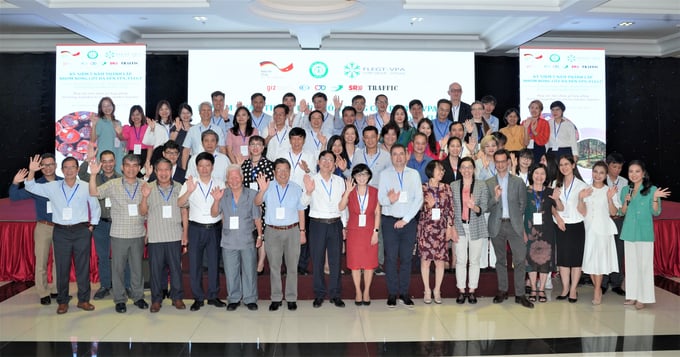
Participants at the workshop to review 5 years of operation of the multi-partner Core Group for implementing the VPA/FLEGT Agreement. Photo: Pham Hieu.
The Vietnam Administration of Forestry (VAF) under the Ministry of Agriculture and Rural Development (MARD) in collaboration with the German Development Cooperation Organization (GIZ) held a workshop on October 27 to summarize the 5-year operation of the multi-partner Core Group (CG) to implement the FLEGT Voluntary Partnership Agreements between Vietnam and the European Union (EU) on Forest Law Enforcement, Governance and Trade (VPA/FLEGT).
Participants at the workshop included more than 60 representatives from VAF, the Core Group members, a technical expert group called JEM and a delegation of the EU.
During its 5 years of operation, the CG held 11 meetings and carried out activities to contribute to developing an action plans on communication and information announcement on the VPA/FLEGT Agreement and building a framework for monitoring and evaluation of VPA/FLEGT implementation, legal documents and dissemination to increase its operation capacity.Speaking at the workshop, Mr. Pham Van Dien, Deputy Director of the VAF said that in the coming time, the CG should focus more on activities. The first is to strengthen the organization. The second is to identify issues, contents and topics for the implementation of the Agreement. The third is to consult and critique and finally continue to perform well the task of providing information on the implementation of VPA/FLEGT in Vietnam.
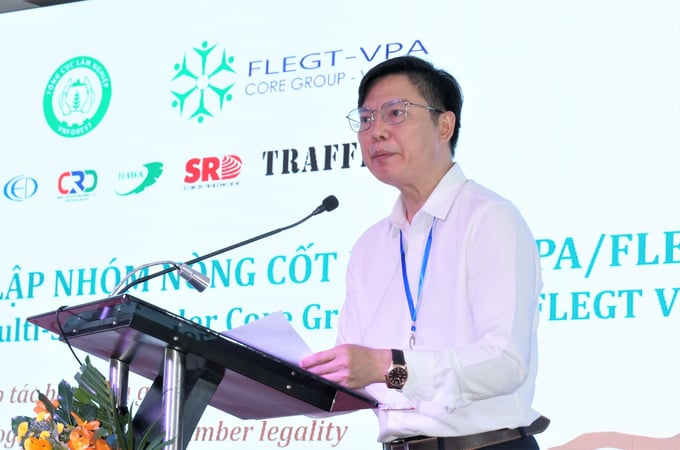
Deputy Director VAF, Pham Van Dien speaks at the workshop. Photo: Pham Hieu.
Over the past 5 years, a number of CG members have also collaborated to develop a Policy Bulletin whose main content is about the Enterprise Classification System of Vietnam (ECS). This is an important step in the process of establishing Vietnam's timber legality assurance system (VNTLAS).
This system will contribute to increasing commercial value, expanding market share and market for Vietnam's wood and wood products, and at the same time reducing the burden of verification and inspection by authorities in the future after FLEGT licensing system comes into operation.
Mr. Cao Chi Cong, Co-Chairman of the CG, said that the CG's Policy Bulletin showed inadequacies and risks in the implementation of regulations on labor contracts, labor insurance and occupational safety in micro and super small timber enterprises while implementing the VPA/FLEGT Agreement.According to Ms. Anja Barth, GIZ Vietnam's Chief Advisor, after the negotiation process, the Agreement has now moved to practical phase.
The focus in coordination between partners has shifted to ensuring consistency between Vietnam's legal framework and the terms agreed by the two sides in the Agreement as well as taking measures to strengthen capacity and support stakeholders' active participation.
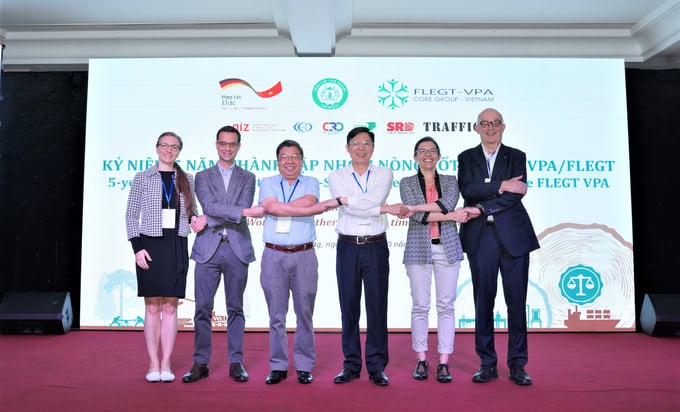
During its 5 years of operation, the CG has held 11 meetings and contributed to developing an action plan on communication and information about the VPA/FLEGT Agreement. Photo: Pham Hieu.
"The CG plays a very important role in the Agreement's successful implementation. I believe both sides recognize and express their appreciation for the contribution and active participation of the CG", emphasized Ms. Anja Barth.
The workshop also provided an opportunity for the partners to contribute and develop ideas for the Group's joint activities in the coming time.
This is also an opportunity for the partners to learn about effective practices in Vietnam and the active contributions of the CG to this process so far.
An exhibition was held at the workshop to display publications highlighting effective messages and practices in VPA/FLEGT implementation; at the same time, introduce and promote the activities, achievements and commitments of CG members and businesses in "cooperation to ensure legal timber" - the slogan of this event. The exhibition also provides an opportunity for organizations to exchange, share, and discuss future cooperation chances.
In October 2018, Vietnam and the EU signed the VPA/FLEGT Agreement with the aim to improve forest governance and regulatory framework for Vietnamese timber and timber products in general and for export from Vietnam to the European Union market.
To ensure the effective and successful implementation of the VPA/FLEGT Agreement, a multi-partner Core Group on VPA/FLEGT was established with the aim of providing a forum for partners to coordinate and participate in the implementation of the VPA/FLEGT Agreement.
To date, the CG has attracted the active and effective participation of more than 40 members representing 6 different groups of organizations, including the private sector, timber industry associations, NGOs, research institutes, international development partners supporting FLEGT projects and verification agencies.
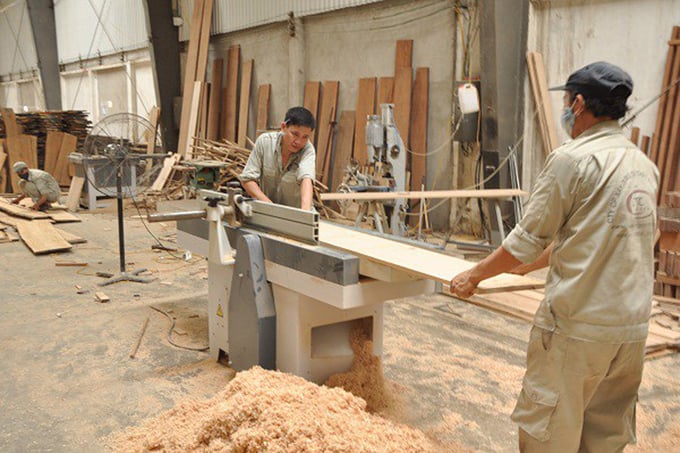
Currently, nearly 14,000 enterprises of different scales are operating in wood processing, wood furniture manufacturing and other wood-based productions. Photo: TL.
Wood and wood products are important export items of Vietnam. Export turnover of these items has been increasing during the past decade.
Total export turnover of wood and wood products increased from USD3.4 billion in 2010 to USD14.5 billion in 2021, making Vietnam the second largest wood exporter in Asia and the fifth largest exporter in the world.
The EU is Vietnam's fifth largest export market for wood and wood products. In 2019, Vietnam's wood product export turnover to the EU reached over USD1.03 billion, accounting for 9.2% of the export market share. Nearly 14,000 enterprises are operating in wood processing, wood furniture manufacturing and other wood production, creating more than 500,000 long-term jobs for workers nationwide. This result contributes to stabilizing social security and sustainable economic development.
However, Vietnam is facing global challenges related to illegal logging and trade. Therefore, a drastic and comprehensive solution is needed to ensure the sustainable and legal growth of Vietnam's timber industry, while promoting good forest governance.
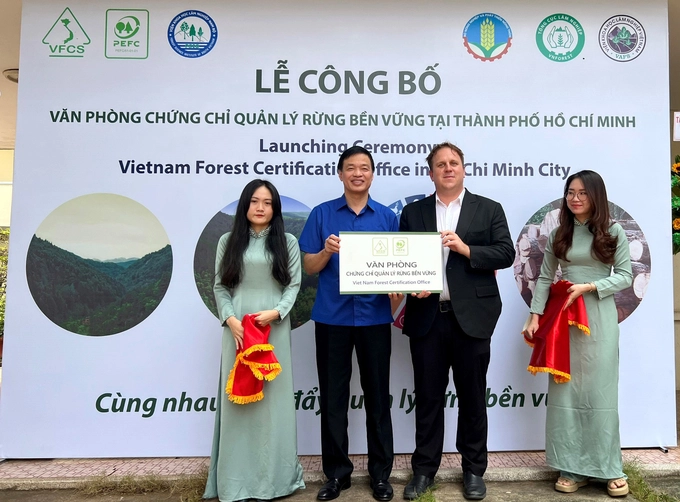
The Vietnam Forest Certificate Office (VFCO) opens a new office in Ho Chi Minh City. VFCO is the organization implementing the Viernam Forest Certification System (VFCS) under Decision No. 1288/QD-TTg of the Prime Minister.
After 6 years of negotiations, the VPA/FLEGT Agreement came into effect in June 2019, the Government of Vietnam issued Decree 102 in September 2020 to stipulate the main contents of Vietnam timber legitimacy assurance system. When the FLEGT licensing system comes into effect, Vietnam will only export wood products with a FLEGT or a CITES license to the EU market. The EU will also only allow Vietnamese timber imported to the EU if it owns a valid FLEGT or CITES permit.
Translated by Linh Nguyen

(VAN) The UNESCO Global Geopark revalidation of Non nuoc Cao Bang and the transition to a two-tier administrative model are presently undergoing a pivotal moment in Cao Bang, the northernmost province of Vietnam.
/2025/06/13/5330-2-004539_953.jpg)
(VAN) Changing policy mindset and removing investment barriers are urgent requirements to open up new development space for enterprises in the agricultural sector.

(VAN) The areas include the restoration of five million hectares of marine ecosystems.

(VAN) Dr. Le Van Nguyen, Director of the Institute of E-Commerce Management (ECM), emphasizes the potential for green development through the cultivation of fruit trees, particularly in provinces such as Son La.

(VAN) VAAS and numerous Vietnamese enterprises have signed cooperation agreements with Japanese partners to promote agricultural technology and trade connectivity.
/2025/05/29/5625-12-214801_567.jpg)
(VAN) Provincial mergers in the Mekong Delta promise to streamline administration, expand inter-provincial raw material areas, and foster close linkages in agricultural value chains, benefiting both businesses and cooperatives.

(VAN) Merging Mekong Delta provinces contributes to the expansion of agricultural raw material areas, addressing previous constraints caused by provincial boundaries. Additionally, this expansion will reduce costs and strengthen linkages between businesses, cooperatives, and farmers.